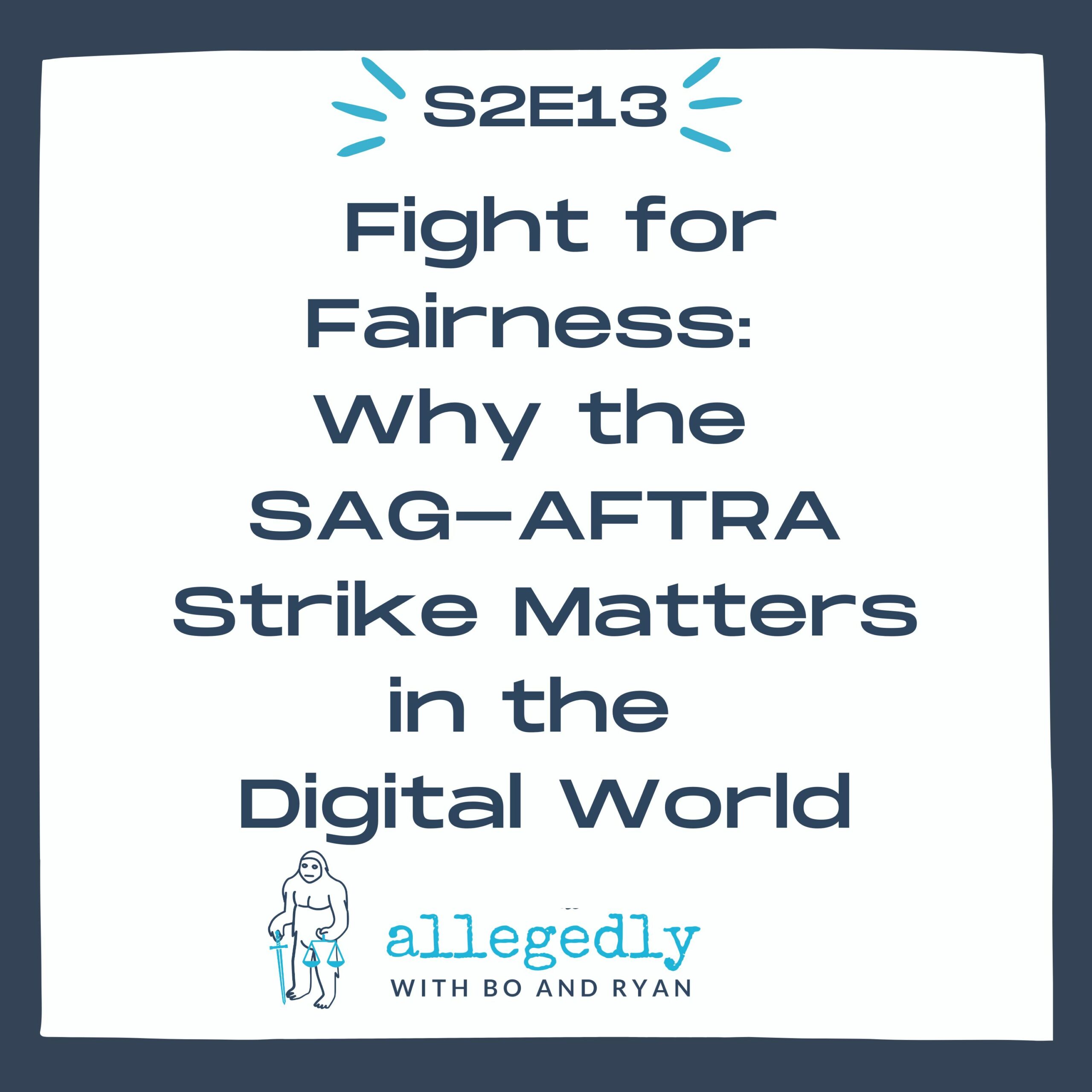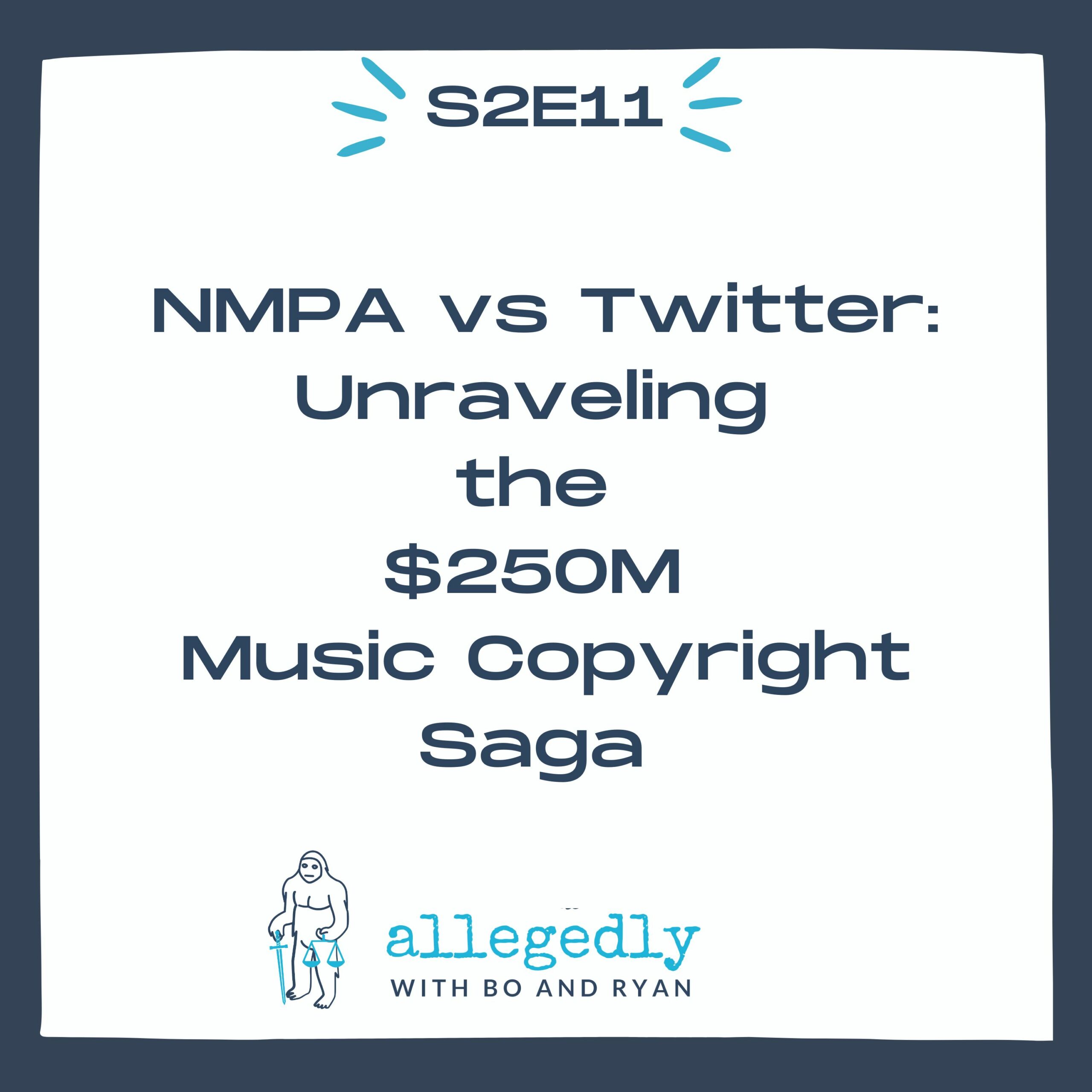allegedly with Bo and Ryan | Season 2 Episode 16
Allegedly… with Bo and Ryan Podcast S2E16| Transcript
Ryan: [00:00:01] Welcome back to another edition of Allegedly with Bo and Ryan. I’m Ryan and with me, as always, is Bo the Magnificent.
Bo: [00:00:09] Oh, well, thank you for that auspicious title, Mr. Ryan.
Ryan: [00:00:13] Of course.
Bo: [00:00:14] Always great to be here. And yeah, we’ve been talking lately about money in the entertainment industry.
Ryan: [00:00:22] Right.
Bo: [00:00:22] It’s obviously a big source of conversation with all these strikes going on. So I want to kind of talk about today if you’re in the entertainment industry, and you want to make certain that you are getting the money to which you’re entitled or even worse, you’re not the next one getting sued, then you have come to the right place today.
Ryan: [00:00:45] For sure. Today we’re delving deep into the deceptive world of Hollywood accounting. It’s all about movies, missing money, and high profile cases. So get your calculators ready because we’re in for a doozy of an episode. But before we get too far in today’s show, Bo, could you break down exactly what Hollywood accounting is?
Bo: [00:01:07] Oh, man. Well, you know how in Harry Potter they have like, the professor of dark arts.
Ryan: [00:01:14] Of course.
Bo: [00:01:15] Hollywood accounting is kind of the dark arts of accounting. It’s when a movie gets made and they report that the movie–[which has] made millions and millions and millions at the box office–technically, according to Hollywood accounting, that movie didn’t make a single penny. Well, Hollywood accounting is what’s used to ensure that those people who are entitled to a percentage of the net profits don’t ever see a dime.
Ryan: [00:01:51] That is so rough.
Bo: [00:01:53] Well, think about it like this. Okay, So let’s say you remember. My daughter and her friend when they were young, they ran a little lemonade stand. Of course.
Ryan: [00:02:05] Best damn lemonade in town, right?
Bo: [00:02:07] Exactly. But so let’s say that the two of them decide that they are going to just split the profits from the lemonade stand. 50-50. Okay. My daughter’s name is Alex. Okay, so now let’s say that Alex decides she’s going to form a company called Alex Inc. Okay. And Alex Inc is then going to sell all of the lemons, all of the water, all of the cups, the pitcher, everything to the lemonade stand for it just happens to be the exact same price as every single dime they made selling the lemonade.
Ryan: [00:02:51] Wow.
Bo: [00:02:51] And so and, you know, that was determined at the end, not in the beginning. So obviously, the lemonade stand never saw one penny of profit. So her partner is never owed a dime because they were going to split the profits 50-50.
Ryan: [00:03:08] So it’s basically like playing hide and seek, but with profits.
Bo: [00:03:12] Well, exactly. And that’s how movies we’re just talking about Harry Potter, the fifth Harry Potter film, for example. It had a budget of $150 million, had a global box office of over 900 million on a $150 million budget, almost made $1 billion. Wow. Yet still magically reported a loss of $167 million.
Ryan: [00:03:40] Ouch. Well, you know what I say to that? Zero points for Gryffindor.
Bo: [00:03:45] Nice.
Ryan: [00:03:46] Lucky for us, though, we have you, Bo, our resident film and television expert, to provide us with some actionable advice on how to navigate around Hollywood accounting and all this foolishness.
Bo: [00:03:57] Well, with pleasure, because it does come up all the time. And there are some solutions. There are ways to guard against it. So let’s let’s go with story time. Ryan.
Ryan: [00:04:07] I love it.
Bo: [00:04:08] Several years back, if I represented a very talented up and coming producer, I’m going to call her Mia. Okay. Now, Mia was approached to produce an adaptation of a best selling novel. Everything seemed like it was perfectly aligned. Stars were aligned for her big break. The studio was excited. Mia was absolutely thrilled. And I’m going through this contract, and that’s when we reach the compensation clause. Okay. Now, the only thing the studio was offering Mia in this contract was a slice of the net profits.
Ryan: [00:04:52] Oh.
Bo: [00:04:53] That’s it. Now, it sounds enticing on the surface, especially when you’re a novice and you truly believe in this project and you think it’s going to make millions and millions. Imagine a percentage of a Hollywood blockbusters earnings, you know, mean that in your mind. You’re thinking, sounds great. Yeah, it could be millions. But obviously knowing, as I did the countless horror stories of Hollywood accounting, those alarm bells immediately started ringing. So I shared a piece of advice with Mia that I share with clients routinely. Always proceed with extreme caution if you’re being offered compensation in the form of net profits. Okay, net profits. If you’re just going to put a very simple definition on it, that’s what’s left over after all expenses are deducted. And sometimes that even includes losses from other films. But trust me, studios are experts in inflating expenses to the point where there will never, ever, ever be a single penny left over in net profits. You will be waiting forever to collect if you have a percentage of the net profit.
Ryan: [00:06:15] So that deal Mia was originally offered, not so great.
Bo: [00:06:19] No. She she never would have seen anything. So. So what did we do? We went back and we negotiated a better deal for Mia. We asked, first of all, most importantly, we asked for gross profit participation. We also asked for auditing rights, and we also asked for minimum guaranteed compensation. And this is why all three of those things are important. Okay. First, instead of net profits, you always ask for a percentage of the gross profits or the gross revenue. This is a share of all the box office collections, all the money made from a movie before the costs are deducted. Now you’re going to negotiate a much smaller percentage in gross than you would in net, but it’s going to be far more lucrative. You’re actually going to get money from that. If the studio does insist on net profits, which is certainly happens fairly frequently, you got to make certain that the definition of net profits is very narrowly tailored, that there’s a cap on exactly what can be deducted as expenses. That way you can ensure they don’t pile up absurd cost after cost after cost that eats away everything and ensures that you don’t have any earnings.
Ryan: [00:07:46] Or even take turkeys from other movies and apply that to your film.
Bo: [00:07:51] Exactly. So the definition of net profits is absolutely crucial. That brings me to that second point about auditing. You’ve got to make certain that the contract allows you or any entity that you nominate, the right to audit the studio’s books. This keeps them honest, and it allows you to trace every single penny. Makes sense. I mean, obviously, you want to be able to make certain that it’s accurate. Finally, if you’re getting a slice of the profits, you always want to ask for either an upfront payment or at the very least, a minimum guarantee. So that’s going to ensure that you get paid regardless of how well the movie performs or how the studio ends up defining profits. Then I guess the last point, you also want to understand how the film is going to be distributed, because that’s another source where you see these numbers really getting fudged. Deals with sister companies or companies related to the studio that actually produced it. That’s going to mean reduced profits. So you want to ensure that the studio can’t undersell the distribution rights to a related company because only the studio benefits in that arrangement, not the actors or anyone else that’s engaged in profit participation.
Ryan: [00:09:22] Gotcha.
Bo: [00:09:22] So going back to Mia, well, we negotiated ultimately a blend of a decent upfront payment and a small percentage of the gross revenues as opposed to net. And we also got the audit rights in there. So her film went on to become actually a pretty big hit and she didn’t have to wait for those mythical net profits to start rolling in before she actually saw money and got paid. So listen, take it from me. I have seen it over and over and over. If you are navigating the treacherous waters of a Hollywood contract, you want to ensure that the light at the end of the tunnel is not just an illusion.
Ryan: [00:10:11] You mean like Wiley Coyote painting a tunnel, but it’s really a rock.
Bo: [00:10:15] Yeah, exactly right. You understand the terms, consult with professionals and make certain that you’re going to be rewarded for the hard work you put in.
Ryan: [00:10:27] I love that. Thanks, bro. So essentially, when in doubt, call Bowen Schmidt and ask for you, Bo.
Bo: [00:10:32] Well, look, I don’t want to say I’m the only person they should call. They can also call and ask for Charles, [laughter]. But Exactly. Give us a call. I’ll take it from there. I’ll make certain that you’re protected.
Ryan: [00:10:47] Awesome. So now that we’ve got some background on this Hollywood accounting, I thought it’d be fun to explore some of the most public and hotly contested Hollywood accounting disputes of all time and there’s some really good ones.
Bo: [00:10:59] Oh, man, there is so many. You know, my favorite. I’ll go first. Darth Vader. Now, Darth Vader was played by a guy, physically at least. I mean, everybody knows his voice was James Earl Jones.
Ryan: [00:11:14] Right.
Bo: [00:11:15] We’ve actually talked about that before. But his physically his body was portrayed by an actor named David Prowse. Okay. He was the iconic villain, this big, hulking presence walking down the hall.
Ryan: [00:11:29] Like the guy when he takes his mask off. He’s the gross looking dude.
Bo: [00:11:33] Exactly. I’m going to guess that they might have used some prosthetics or make up there, but not saying David Prowse was necessarily gross, but …
Ryan: [00:11:45] Fair enough.
Bo: [00:11:46] But, you know, he was very vocal about the problems he ran into with Hollywood accounting in these movies. So in an interview with Equity magazine, he said that he had never seen one single residual payment for his work in “Return of the Jedi,” which is obviously the third film in the original trilogy. “Return of the Jedi,” Ryan, Has technically never once posted a profit to this day.
Ryan: [00:12:18] How on earth is that even possible?
Bo: [00:12:21] I mean, the notion that Return of the Jedi was not a profitable film seems outrageous considering that the film, way back when it was released, grossed more than $500 million worldwide, which, adjusted for inflation, would be about $1.4 billion today.
Ryan: [00:12:42] Wow.
Bo: [00:12:43] But thanks to Hollywood accounting, Prowse was absolutely right. The amount of revenue generated by the film technically has never surpassed the amount of expenses that they claim. So in that article, it was great, Prowse gave this advice to young actors. He said “There’s a big difference in having a share of gross profits and having a share of the net profit. It is a huge difference. All in that one word, sometimes with the net profit, with all the expenses and so on, it really seems you end up paying them.” [Laughter].
Ryan: [00:13:25] Wow.
Bo: [00:13:26] Now, granted, that interview was given in I think it was 2009, but that was still 26 years after the film was released and still the film has not broke even. So, you know, it’s just going to get worse in the streaming age because now no one’s seeing residuals at all, basically.
Ryan: [00:13:46] No kidding. I mean, we’ve been talking about how we are in the most depressing time that has ever existed for actor residuals. And we hope that the strike will result in some meaningful pay raises. But I think the heyday of these big payouts may be behind us.
Bo: [00:14:00] Yeah, well, let’s hope not. But I mean, that’s one of the reasons they’re out there right now with the signs for sure.
Ryan: [00:14:06] Well, I’ve got one. So back in 2002, Marvel Studios wasn’t quite the media giant they are today. And there certainly was no MCU. That same year was the very first Spider-Man film starring Tobey Maguire. Now, this movie was a huge hit. Of course, it grossed $821 million globally. But the creator of Spider-Man characters never saw a dime. Stan Lee is, of course, what we’re talking about. The only problem is here, Stan Lee had a contract with Marvel Enterprises Inc, the holding company that owned everything Marvel, and under that contract, he was entitled to a profit participation equal to 10% of all profits from any live action or animated television or film project utilizing Marvel characters, including ancillary rights such as merchandising. So a pretty sweet deal.
Bo: [00:15:00] I mean, it would sound like it on paper.
Ryan: [00:15:01] Well, here’s the problem. The term “profits” was not defined at all in this contract.
Bo: [00:15:08] If the listeners could see me, I am legitimately face palming.
Ryan: [00:15:14] I don’t understand with that much money at play. But predictably, Marvel claimed that the use of the word profits was intended to mean net profits, and since the film had not yet turned a profit, thanks to Hollywood accounting, Lee wasn’t owed anything. Well, Lee filed suit and argued that the word profit, of course, meant gross profits. The court agreed with him and ultimately awarded him $10 million in damages.
Bo: [00:15:41] Well, I’m going to tell you honestly, it sounds like Stan Lee got really lucky there, because that just as easily could have gone the other way for sure with that much money at stake. Listen, it is insane that not a single one of those lawyers on either side caught the fact that profits was not defined or clarified. They made mistake number one. They did not hire us.
Ryan: [00:16:12] I like it.
Bo: [00:16:12] All right. Let me let me give you another one. Have you ever heard of Art Buchwald?
Ryan: [00:16:17] I that name sounds super familiar, but can’t can’t point it.
Bo: [00:16:21] Well, he’s a writer and he wrote a treatment and he pitched it to Paramount. Now, a film treatment, if you if you don’t know, that’s just a summary of a film or a television show that a writer will use in order to sell a project prior to writing the full script. Okay. Now, the treatment that Art Buchwald presented to Paramount, it told the story of a king from a foreign land who visits the United States to find a wife. Now, Paramount was intrigued. They entered into a contract with Buchwald, which essentially promised that if Paramount made a movie based on that treatment, that Buchwald would receive 1.5% of the net profits.
Ryan: [00:17:08] Okay.
Bo: [00:17:09] Well. You could probably see where this is going. Not too much. Later, Paramount released “Coming to America,” starring Eddie Murphy. A film with a story identical to Buchwald’s treatment.
Ryan: [00:17:26] Yeah, sounds like it.
Bo: [00:17:27] But the studio claimed. Sorry, Art. Eddie Murphy wrote Coming to America. Thus you’re not entitled to anything.
Ryan: [00:17:37] Oh man.
Bo: [00:17:38] So Buchwald consulted an attorney. They sent Paramount– this is one of my favorite parts of the story, okay. The attorney did the right thing. A lot of times as lawyers, we know, you don’t have to go out the gate just guns blazing. A lot of times you can reach out to the other side. You could say, ‘look, we’ve got this dispute. We’d like to work it out before having to go to court and have all these expenses of litigation, you know, all these fights. Let’s just try to nip it in the bud. Let’s let’s work it out early.’.
Ryan: [00:18:11] Right.
Bo: [00:18:11] So that’s what Buchwald’s lawyer did here. They sent Paramount a copy of the complaint before it was filed, said, ‘Look. We don’t want to file this. Let’s just enter in a settlement discussions.’ But Paramount, to say the least, was unaffected and unimpressed. So you know what they did?
Ryan: [00:18:33] What did they do?
Bo: [00:18:36] Upon receiving the complaint. One of the Paramount executives allegedly sent Buchwald a bottle of champagne and a tape of a song from the musical Guys and Dolls called “Sue Me.” Well, be careful what you wish for, because Buchwald did sue Paramount and won. And the court ultimately found that “Coming to America” was indeed based upon his treatment and that Paramount owed him 1.5% of the net profits. But. Unfortunately, because it was net profits, the battle’s only half over at that point because Paramount, to the surprise of absolutely no one, turned around and claimed that the film, which had a global box office of almost $300 million, had not turned a profit. Thus, he was still entitled to nothing.
Ryan: [00:19:36] That is so rough. And that’s where things get interesting for our discussion. Buchwald then hires an accounting firm to audit Paramount’s books, and finding an accounting firm itself proved to be incredibly difficult. Allegedly, Paramount had pressured and conflicted out just about every major Hollywood accounting firm to keep them from working with Buchwald. So finally, he finds a firm up for the task. But Paramount are just real dicks. They force the auditors to perform the audit at their own headquarters and require them to adhere to these incredibly strict guidelines which even prohibit them from using the restroom or getting up to get a cup of coffee without a Paramount approved escort. They end up enduring these repressive conditions. It proves to be worth it. When the auditors discovered that Paramount had failed to completely cover their tracks when using two different accounting softwares. This is this is pretty bad. So apparently, Paramount had used two softwares to calculate the film’s profits and losses. One system used the classic Hollywood accounting tricks of charging the film’s individual corporation an outrageous fee intended to make it almost impossible to achieve any net profits. The problem is they had another system. In the other system, which was mainly used to show paramount stockholders just how much money the company was making, that calculation subtracted only the legitimate expenses from the film’s profits. In other words, they didn’t deceptively charge the film’s individual corporation an outrageous fee and just paid back their out of pocket expenses. So in an attempt to ease the minds and shareholders who might worry about the company being mismanaged, Paramount used the second accounting system to essentially say, ‘Hey, don’t worry, it’s all smoke and mirrors. We still have plenty of money rolling in.’
Bo: [00:21:31] Oh, boy. Cannot see this ending well.
Ryan: [00:21:33] No. So, Buchwald’s lawyers loved this. They took the auditor’s findings to court. The judge expressed extreme distaste for Paramount’s deceptive accounting practices, but he only awarded Buchwald a little more than $150,000.
Bo: [00:21:49] Yikes.
Ryan: [00:21:49] And I highly doubt that even came close to covering his legal fees.
Bo: [00:21:53] Absolutely not. I mean, that just sucks. But that’s again, that’s a so-called classic Hollywood accounting. Um, but, you know, lately, as we’ve been keeping an eye on this, there’s kind of been an evolution of this that makes it even worse. Look, we’re entertainment lawyers. We see more and more lately of what’s known in the industry as sweetheart deals. Basically, studios cutting deals with their own affiliates or subsidiaries to, let’s just say, balance the books.
Ryan: [00:22:30] It has such a cute name, but it’s really f*cked up.
Bo: [00:22:34] Now, think. Think about it this way. Do you ever wonder why FX, for example, gets to play some huge Marvel or Star Wars movies on TV that are just a few years old? Well, it’s because FX is owned by Disney and they happen to then get the distribution deal. And so they pay close to nothing for the rights to air them on television. Peter Jackson, who obviously famous director, Lord of the Rings, he had a huge run in with this situation when in the “Lord of the Rings” trilogy. He received far less money than he anticipated when he directed “Fellowship of the Ring.” So he sued New Line Cinema, claiming that they undervalued the distribution rights by prioritizing internal bids over open bidding. So basically, according to Jackson, they were keeping it all in the family.
Ryan: [00:23:43] Not getting that fair market value of what it would have been.
Bo: [00:23:45] Right. Exactly. So the reason that was crucial, of course, is that Jackson, per his contract, was entitled to a percentage of the sales price of the ancillary rights or the distribution rights. And so he claimed that this use of this closed bidding permitted New Line to sell those rights for far less than their fair market value, and he also claimed that doing it this way incentivized them to accept a lower price. And they didn’t really lose out on anything because all those rights basically remained with themselves. Their own family.
Ryan: [00:24:25] Makes sense.
Bo: [00:24:25] Now. If they had accepted bids from non-affiliated entities, Jackson, you know, alleged in his complaint, they would have received multiple competitive bids which would have driven the price way up. Now, there’s almost no question that that would have been true. And again, we’re seeing that constantly now, these production companies selling the distribution not to themselves, but to companies for which they are affiliated or it’s a subsidiary of the production company, and it’s therefore far less in value than you would see out on the open market.
Ryan: [00:25:05] Yikes.
Bo: [00:25:06] Well, ultimately, Peter Jackson’s lawsuit proceeds to court. So luckily he had made certain that he had one of those audit provisions in his contract that we were discussing earlier, and he exercised that audit provision and demanded to audit new lines, books. So New Line, to the surprise, again of no one, was a little reluctant to allow Peter Jackson to review their books. So you know what they gave him in discovery in the lawsuit?
Ryan: [00:25:37] Okay.
Bo: [00:25:37] They say, ‘okay, here’s all our accounting records,’ and they bring in one half full box of documents and said this contains 100% of all the communications and documents from profit participants and any audits on any New Line property, film, television soundtracks or video games. This is everything.
Ryan: [00:26:04] Of one of the biggest movies of the year.
Bo: [00:26:06] Yeah, well, the thing is, it wasn’t just that movie. They said this was their audits for everything they had ever done. All in one half of one banker’s box.
Ryan: [00:26:18] How efficient are they? Wow.
Bo: [00:26:19] Like we literally have more paperwork on, you know, the simplest contract we do, basically. And it was just absurd. So, in a subsequent deposition, an auditor employed by New Line ultimately admitted under oath that New Line had quite a bit more of accounting records. I mean, basically a dozen full filing cabinets filled to the brim with accounting records that they had not turned over.
Ryan: [00:26:52] He was like, I’m not going down for this man.
Bo: [00:26:54] Exactly like Cousin Craig. So Jackson took this evidence to the judge, sanctioned new line to the tune of, I think it was $125,000, ordered the studio to produce all third party audits, as well as any internal audits of “Fellowship of the Ring.” And then that’s when they were able to get everything resolved. I mean, the suit ended up getting settled about two months later for a quote unquote, undisclosed amount.
Ryan: [00:27:25] A sh*tload of money.
Bo: [00:27:27] In other words. But and considering that, you know, Peter Jackson was then brought back to produce and direct the, I’m going to say, inferior Hobbit trilogy, it does fair it does prove the age old adage, you know, business isn’t personal. So my guess is that he received exactly what he asked for in the spinoff.
Ryan: [00:27:53] Wow. I mean, Hollywood accounting isn’t just about inflating those expenses. It’s also about getting those deals, like you were saying, that that really brings us to the most recent lawsuit on our list. And really the whole reason why we talked about this, this show to begin with.
Bo: [00:28:07] Oh, yeah, this has been if you go to some of the major like the Hollywood Reporter, Variety, Deadline, you know. This has been dominating recently, this lawsuit.
Ryan: [00:28:18] Yeah, this is a good one. So. Walt Disney Company is currently facing challenges on multiple fronts. It’s been a rough one for them, including labor issues with the strikes, [and] significant losses from streaming. And amidst these challenges, Disney is now being sued by TSG entertainment, one of its biggest financial partners. So TSG Entertainment is a film financing firm. It filed a lawsuit against Disney and its subsidiary, 20th Century Studios, which was previously 20th Century Fox. And the lawsuit accuses them of both a breach of contract and of self-dealing. So the whole lawsuit revolves around Disney allegedly creating these sweetheart deals to feature these TSG backed movies on its streaming platforms such as Disney+ and Hulu. So this move is really aimed at increasing subscriber numbers for these platforms and minimizing profits. So TSG claims that this meaningfully and significantly deprived them of some really substantial revenue. And when you want to think about the amount of money that has supported these films, it claims that it’s invested over $3.3 billion with the studios for more than 140 films on 20th Century Fox, including hits like “Avatar: The Way of the Water” and the “Banshees of Inisherin.” So they had this revenue participation agreement with 20th Century Fox, which outlined that they would receive a portion of the certain film’s revenue in return for co-financing of the production. Well, you can see what’s happening now. Obviously they hire an independent auditor after noticing a steep decline in returns on their investment. And the audit revealed evidence of Hollywood accounting and sweetheart deals that suggested that 20th Century Fox had underpaid TSG by at least $40 million. The lawsuit also alleges that 20th Century did not credit TSG with a revenue as per their agreement and wrongfully charged them millions of dollars in distribution fees. Additionally, 20th Century has even been doing these self-dealing licensing deals to its cable affiliate at extremely low undervalued rates.
Bo: [00:30:36] So, [what] you’re talking about, it encapsulates everything we were talking about.
Ryan: [00:30:41] I mean you got old Hollywood accounting, new Hollywood accounting, sweetheart deals. You know, Disney is just not doing so great right now. So we’ll have to wait and see how this one ultimately plays out. But from where we’re sitting, it doesn’t look so good for the House of the Mouse.
Bo: [00:30:54] No, they are walking right into a mouse trap right now. So, you know, Bob Iger, you know, was just in the news about with the WGA strike. And apparently, you know, there was some real hope for a while there that some progress was being made. And apparently, you know, Bob Iger was among the handful of really high level studio executives that were going to meet with the writers negotiating team. And most people were thinking, okay, if this is happening, they must be serious. Right. But I can just imagine Bob Iger just being like, ‘okay, we’re fighting war on enough fronts here. Let’s get this worked out.’ But then it turned out that it really went nowhere. And they then just released the the offer that they had made to the writers publicly, which I’m not going to say I’m the world’s foremost expert on labor laws, but labor negotiations with labor unions is really supposed to be kept confidential. And so that was a major faux pas on their part. I think the hope was that it would maybe kind of eat into the individual writers resolve, like, you know, oh, look, this isn’t such a bad deal. Maybe we should get back to work. But it definitely had the opposite effect. It really infuriated a lot of people. So it you know, Disney is having some issues right now.
Ryan: [00:32:29] Oh, for sure. I mean, that’s that’s kind of like the opposite of what, you know, SAG did releasing their their own deal points with the AMPTP. You know, they were doing it to really galvanize their their own base. I guess the AMPTP was releasing it like, look how good this deal is.
Bo: [00:32:47] And, you know, look, I’m still optimistic because the deal that was released did at least address pretty much all of the things that the writers were asking for. They just didn’t address it enough, you know, and to their liking. But the fact that they were addressing them at all, I still am going to choose to think is a good sign. But it’s going to take more. It’s going to take not just saying ‘we’ll do a little,’ but it’s going to take ‘we’ll do enough.’ So, you know, going back to the lawsuit with Disney, you’re talking preemptive bidding, which is bullsh*t. Nonexclusive licensing deal, very low licensing fees. These are all designed to make the studios a ton of money. But they also they stir up massive controversies and they directly affect, financially, the creatives who pour their heart and soul and blood and sweat and tears into every single project. These practices are designed to maximize the amount kept by the studios and minimize the amount paid out to the creatives. So for all the entertainment professionals out there, the message is clear: Keep your eyes wide open, know what you are signing, and always get a good lawyer on your team.
Ryan: [00:34:19] Absolutely, Bo. And understanding the complexity of these contracts, the net profits versus gross profits and staying updated with these evolving tactics can make all the difference in the world. You know, our aim in this podcast isn’t to paint a grim picture of how messed up the entertainment industry is, but really to empower you to reach your fullest potential and be fairly compensated for your work.
Bo: [00:34:43] Absolutely. I mean, Hollywood may be the dream factory, but some of the accounting practices, they definitely qualify as nightmares, for sure.
Ryan: [00:34:52] Well, that’s our show for today. To continue to receive free edge-of-your-seat legal anecdotes, please subscribe to our podcast and share with at least one friend.
Bo: [00:34:59] Thank you for tuning in to another edition of Allegedly with Bo and Ryan. We’ll catch you next time as we continue to explore the legal maze that is the entertainment industry.














